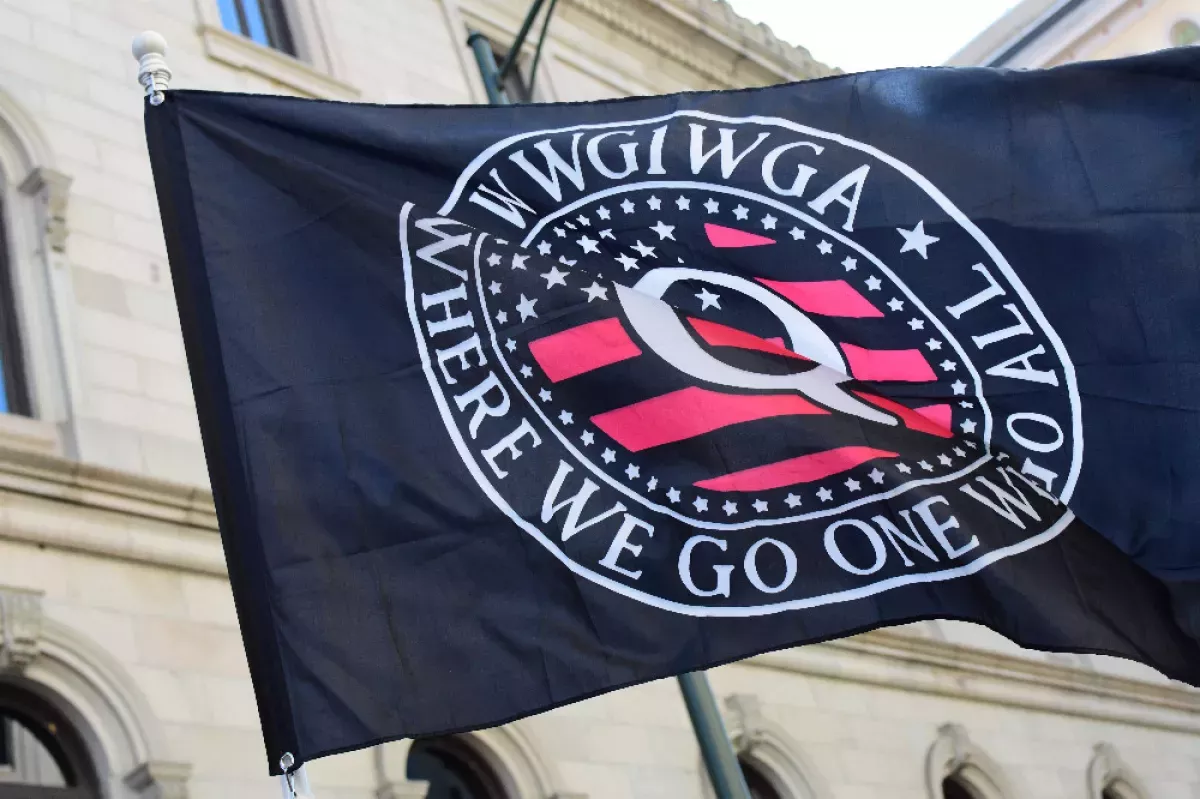QAnon is a far-right American conspiracy theory and political movement that emerged in 2017. It is centered around online posts by an anonymous individual or group using the name "Q". QAnon followers believe in a baseless theory about a "deep state" cabal of Satan-worshipping pedophiles running a global child sex trafficking ring and plotting against former President Donald Trump. The movement, often described as cult-like, has roots in earlier conspiracy theories like Pizzagate and incorporates elements from others. Its online claims have been amplified and spread by various communities and influencers.
1903: Publication of "The Protocols of the Elders of Zion"
"The Protocols of the Elders of Zion," a fabricated anti-Semitic text, was published in 1903, spreading harmful conspiracy theories about Jewish people.
1933: Twentieth Amendment Changes Presidential Inauguration Date
The Twentieth Amendment to the United States Constitution was ratified in 1933, changing the presidential inauguration date from March 4 to January 20.
1964: Publication of "The Paranoid Style in American Politics"
In 1964, historian Richard Hofstadter published his essay "The Paranoid Style in American Politics," which explores the role of paranoia and conspiracy theories in American politics.
2006: Malinowski's Lobbying Work Misrepresented in QAnon-Fueled Attacks
In 2006, during his time as a lobbyist for Human Rights Watch, Tom Malinowski's work on a crime bill was later misrepresented in a 2020 campaign ad, leading to false accusations from QAnon supporters that contributed to death threats against him.
March 2016: Pizzagate Ignites
March 2016 saw the start of the Pizzagate conspiracy theory, which falsely claimed that high-profile Democrats were involved in a child sex ring. This theory directly influenced QAnon.
July 2, 2016: The Rise of Anonymous "Insider" Posters
"FBIAnon", an anonymous poster claiming to have inside information, started posting false claims about Hillary Clinton in July 2016, foreshadowing the anonymous posting style of Q.
2016: Edgar Maddison Welch Incident at Comet Ping Pong
In 2016, Edgar Maddison Welch, motivated by the Pizzagate conspiracy theory, fired an assault rifle inside the Comet Ping Pong pizzeria in Washington, D.C., demonstrating the dangerous consequences of online misinformation.
2016: Flynn's Words Inadvertently Inspire QAnon
In 2016, Michael Flynn, former National Security Advisor, made a statement about Trump being elected by an "army of digital soldiers." This quote was adopted by QAnon followers who began referring to themselves as "digital soldiers," showcasing an early instance of Flynn's unintentional influence on the movement.
2016: Pizzagate Sets the Stage
In 2016, the Pizzagate conspiracy theory, alleging a child sex trafficking ring run by Democrats, emerged. It laid the groundwork for QAnon's later claims.
August 2017: More Anonymous Posters Emerge
In August 2017, "WHInsiderAnon" appeared, hinting at major events related to leaks affecting the Democratic Party, further contributing to the trend of anonymous "insider" posters.
October 2017: "Q" Makes First Appearance
The anonymous figure "Q" began posting cryptic messages on 4chan in October 2017, claiming to be a high-level government official with Q clearance, marking the formal start of QAnon.
October 28, 2017: "Q Clearance Patriot" Appears
A 4chan user named "Q Clearance Patriot", later known as "Q", made their first post on October 28, 2017, introducing the concept of "The Storm" and the idea of mass arrests of alleged pedophiles.
November 2017: QAnon Gains Mainstream Attention
In November 2017, QAnon entered the realm of mainstream media attention, with Newsweek drawing parallels to the Pizzagate conspiracy theory.
November 2017: QAnon Spreads to New Platforms
In November 2017, QAnon started spreading from 4chan to other platforms like Reddit, Twitter, and YouTube, facilitated by individuals like Tracy Diaz, Paul Furber, and Coleman Rogers.
November 2017: QAnon Gains Traction
Q's posts increased in November 2017, focusing on conspiracy theories about Clinton, Obama, and others. An online community formed around deciphering Q's messages.
December 2017: Russian-Backed Accounts Spread QAnon Claims
As early as December 2017, Russian-backed social media accounts began promoting QAnon claims, according to Reuters, highlighting early foreign efforts to amplify the conspiracy theory.
December 2017: Russian Television Network RT Airs Segment on QAnon
In December 2017, the Russian television network RT, known for its pro-Kremlin stance, aired a segment discussing QAnon's claims, potentially giving the conspiracy theory a wider platform and contributing to its spread.
2017: Potential Start of Watkins' Involvement
Brennan's speculation placed the potential takeover of the Q account by Jim and Ron Watkins in late 2017 or early 2018.
2017: Birth of QAnon
QAnon, a far-right conspiracy theory, emerged in 2017, spreading fabricated claims about a "deep state" cabal of pedophiles working against Donald Trump.
March 13, 2018: Operation Rescue VP Endorses QAnon
On March 13, 2018, Cheryl Sullenger, vice president of the anti-abortion group Operation Rescue, publicly endorsed QAnon, lending credibility to the conspiracy theory among her followers.
March 2018: Reddit Bans /r/CBTS_Stream
In March 2018, Reddit banned the /r/CBTS_Stream community, known for discussing QAnon, citing concerns about encouraging violence and sharing personal information.
March 2018: r/CBTS_Stream Subreddit Shut Down
The Reddit subreddit r/CBTS_Stream, a hub for QAnon discussions, was permanently closed in March 2018 due to concerns about inciting violence and sharing private information.
April 2018: Emergence of QAnon Slogans
April 2018 marked the first appearance of the popular QAnon slogan, "Where we go one, we go all" (WWG1WGA), reflecting the movement's growing sense of collective identity.
April 2018: QDrops App Popularity
In April 2018, the 'QDrops' app, which promotes the QAnon conspiracy theory, gained significant popularity, becoming a top-ranking paid app in Apple's App Store.
June 2018: Time Magazine Lists Q Among Most Influential People on the Internet
In June 2018, Time magazine included Q, the anonymous figure behind QAnon, in its list of the 25 Most Influential People on the Internet, highlighting the conspiracy theory's growing reach and impact.
July 2018: QAnon Enters the Political Arena
July 2018 marked a turning point as QAnon followers made their presence known at a Trump rally in Tampa, Florida, signifying the movement's growing visibility in the political landscape.
August 2018: Poll Reveals Low Favorability of QAnon in Florida
An August 2018 Qualtrics poll conducted for The Washington Post showed that while a majority of Floridians were familiar with QAnon, most held unfavorable views of the conspiracy theory.
August 2018: QAnon Garners Mainstream Media Attention After Trump Rally
In August 2018, following a Trump rally where QAnon supporters were present, major news outlets, including MSNBC and PBS NewsHour, dedicated segments to covering the conspiracy theory, signaling its growing presence in the public sphere.
August 2018: Anti-Defamation League's Analysis of QAnon and Anti-Semitism
In August 2018, the Anti-Defamation League (ADL) published an analysis of QAnon, noting that while not inherently anti-Semitic, QAnon exhibits troubling examples of anti-Semitism in its targeting of Jewish figures like George Soros and the Rothschilds.
August 2018: QAnon Enters the Physical World
QAnon followers started appearing at Trump rallies in August 2018, signaling the transition of the online conspiracy theory into a physical political movement.
August 24, 2018: Trump Hosts QAnon Promoter in Oval Office
On August 24, 2018, President Donald Trump hosted Michael William "Lionel" Lebron, a prominent QAnon figure, in the Oval Office for a photo opportunity, further fueling speculation about potential connections between Trump and the conspiracy theory movement.
September 12, 2018: Reddit Bans QAnon Communities
On September 12, 2018, Reddit took action against several communities dedicated to discussing QAnon, banning them for inciting violence, harassment, and the spread of personal information. This led many followers to migrate to Voat.
December 19, 2018: QAnon-Related Arrest Highlights Anti-Government Extremism
On December 19, 2018, a man in California was arrested with bomb-making materials, intending to target a monument in Springfield, Illinois, to raise awareness about Pizzagate and the New World Order, illustrating the FBI's concerns about anti-government extremism fueled by conspiracy theories.
2018: Potential Takeover of Q Account
Brennan believes that Ron Watkins might have taken control of the Q account from Furber using his administrator privileges on 8chan.
2018: Watkins Takes Over as Q, According to Analysis
Forensic linguistic analysis suggested that Ron Watkins assumed control of the Q account in 2018.
2018: QAnon Symbol Posted
In 2018, Kelly Townsend publicly aligned herself with QAnon by posting the movement's symbol on her social media account.
2018: Matthew Phillip Wright Incident at Hoover Dam
In 2018, Matthew Phillip Wright engaged in an act of extremism at Hoover Dam, influenced by conspiracy theories, highlighting the potential for real-world violence.
2018: QAnon Links Vaccines to Conspiracy Theories
In 2018, Q made claims connecting "vaccines [not all]" to the Big Pharma conspiracy theory, further fueling distrust in established institutions.
2018: QAnon's Expanding Conspiracies and Targets
In 2018, QAnon expanded its reach by targeting various individuals and organizations. This included accusing Planned Parenthood of harvesting fetuses and alleging that Ruth Bader Ginsburg was a member of the "cabal." These accusations reflected the movement's growing influence and widening scope.
2018: QAnon's Incorporation of JFK Conspiracy Theories
In 2018, QAnon followers began incorporating elements of the JFK assassination conspiracy theories into their narrative, claiming that John F. Kennedy Jr. faked his death and was secretly Q. This illustrated the movement's ability to absorb and adapt existing conspiracy theories into its evolving storyline.
2018: Media Outlets Debunk QAnon and Label Followers as Conspiracy Cultists
In 2018, media outlets, including The Washington Post, began actively debunking QAnon's claims, labeling its followers as members of a "deranged conspiracy cult" and highlighting the dangers posed by the theory's spread.
2018: QAnon's Reliance on Unproven Claims from Isaac Kappy
QAnon's accusations of child abuse against celebrities stemmed from unverified claims made by actor Isaac Kappy in 2018. This reliance on unreliable sources further underscored the movement's tendency to embrace misinformation and conspiracy theories without substantial evidence.
2018: QAnon Emerges in Australia
Researcher Cam Smith observed mentions of QAnon within Australian communities as early as 2018, indicating the movement's early presence in the country.
2018: QAnon Merchandise Proliferates
The year 2018 witnessed the widespread availability of QAnon-related merchandise on platforms like Amazon, indicating the movement's expanding reach.
February 2019: Liz Crokin's Warning of "Vigilante Justice"
In February 2019, QAnon follower Liz Crokin expressed impatience with the lack of arrests related to the conspiracy theory's claims and warned of potential "vigilante justice."
May 2019: FBI Identifies QAnon as Domestic Terrorism Threat
In May 2019, the FBI's Phoenix field office issued an "Intelligence Bulletin" memo that classified QAnon-driven extremists as a domestic terrorism threat, citing prior arrests linked to the group and highlighting the potential for violence motivated by conspiracy theories.
August 2019: QAnon Seeks New Homes
Following the shutdown of 8chan in August 2019 due to its association with violent incidents, QAnon followers migrated to platforms like Endchan and later 8kun.
August 2019: "Digital Soldiers Conference" Promotes QAnon Ideology
The "Digital Soldiers Conference" was announced in August 2019, featuring QAnon symbolism and speakers like Michael Flynn and George Papadopoulos. This event aimed to prepare "patriotic social media warriors" for a "digital civil war," highlighting the increasing organization and mobilization of QAnon supporters.
November 2019: Q Tripcode Changes and Identity Uncertainties
The Q tripcode, used for verifying identity, changed multiple times, raising questions about the consistency of the poster's identity. The tripcode was also compromised on several occasions.
2019: QAnon Gains Traction in Congressional Races
During the 2019 elections, two Republican congressional candidates publicly expressed their support for QAnon theories, indicating the growing influence of the conspiracy theory movement within political spheres.
2019: QAnon Infiltrates Bestseller Lists
In 2019, a book purportedly written by QAnon followers gained traction on Amazon's bestseller list, potentially highlighting attempts at manipulating algorithms to promote the conspiracy theory.
2019: Twitter Removes Accounts Linked to Russian Interference
In early 2019, Twitter took action against accounts suspected of ties to the Russian Internet Research Agency that were found to be spreading QAnon-related content, including the use of the #WWG1WGA slogan.
2019: Trump's Post-Christmas Retweets Boost QAnon Visibility
Shortly after Christmas in 2019, President Trump amplified QAnon content by retweeting over a dozen accounts associated with the conspiracy theory movement, further solidifying his connection to the group in the eyes of his followers.
2019: Russian State Media Amplifies QAnon
Starting in 2019, Russian government-funded media outlets such as RT and Sputnik began amplifying QAnon, citing it as evidence of internal divisions within the United States.
January 2020: Sidney Powell's Early QAnon Involvement
Despite initial denials, Sidney Powell's engagement with QAnon became evident in early 2020. Her retweeting of QAnon accounts and appearances on QAnon-affiliated YouTube channels demonstrated a growing connection with the movement.
March 2020: Pew Survey Shows Low Awareness of QAnon
A Pew survey conducted in March 2020 revealed that a significant majority of Americans (76%) had never heard of QAnon.
March 23, 2020: QAnon and the COVID-19 Pandemic
On March 23, 2020, Q finally acknowledged the COVID-19 pandemic, referring to it as the "China virus", marking the beginning of QAnon's entanglement with pandemic-related misinformation.
May 2020: Facebook Removes QAnon-Linked Pages and Accounts
In May 2020, Facebook took down multiple pages, accounts, and groups connected to individuals associated with the QAnon network. This action was part of their investigation into suspected coordinated inauthentic behavior in the lead-up to the 2020 United States election.
May 2020: Google Removes QAnon Apps
In May 2020, Google took action against several QAnon-related apps, removing 'QMAP,' 'Q Alerts!,' and 'Q Alerts LITE' from its Android app store due to violations of its terms of service.
June 2020: QAnon Activity Surges During Pandemic
Between March and June 2020, during the COVID-19 pandemic, QAnon activity significantly increased across social media platforms, coinciding with the spread of the movement to Europe.
June 2020: Growth of Support Groups for Families Impacted by QAnon
By June 2020, online support groups like the subreddit r/QAnonCasualties, which offered support for families impacted by loved ones drawn into QAnon, saw significant growth, highlighting the destructive impact of the conspiracy theory.
June 2020: Elected Officials' QAnon Ties Come to Light
In June 2020, Congresswoman Marjorie Taylor Greene and Arizona House Election Chairwoman Kelly Townsend, both known QAnon adherents, gained attention for their attempts to overturn the results of the 2020 presidential election.
June 2020: Fredrick Brennan's Claims About Jim Watkins
In June 2020, Fredrick Brennan, 8chan's founder, claimed that Jim Watkins could identify Q and suggested a close connection between them.
June 2020: QAnon Co-opts #SaveTheChildren, Spreading False Claims
In June 2020, QAnon followers began co-opting the hashtag #SaveTheChildren, using it to promote false claims about child trafficking and exploitation. This tactic, which led to criticism from the legitimate organization Save the Children, illustrated QAnon's exploitation of social media to spread misinformation and manipulate public discourse.
June 30, 2020: Boebert's Upset Victory and QAnon Ties
June 30, 2020, marked an upset victory for Lauren Boebert, who defeated incumbent Republican representative Scott Tipton in the primary for Colorado's 3rd congressional district. Despite initially expressing some support for QAnon, Boebert distanced herself from those statements after her win, claiming she was not a follower.
July 4, 2020: Flynn Publicly Aligns with QAnon
On July 4, 2020, Michael Flynn posted a video reciting the QAnon oath, "Where we go one, we go all," solidifying his public alignment with the conspiracy theory. Despite denials from his representatives, this action positioned Flynn as a prominent figure within the QAnon movement.
July 2020: Flynn Family Denies QAnon Affiliation
Despite Michael Flynn's public displays of support for QAnon, his family, in their lawsuit filed in March 2021, denied any allegiance to QAnon. They claimed the oath seen in a July 2020 video was to the Constitution, not QAnon, creating a contradiction between Flynn's actions and his family's statements.
July 2020: Twitter Bans QAnon Accounts
In July 2020, Twitter announced a ban on over 7,000 accounts associated with QAnon due to their involvement in coordinated activities amplifying fake news and conspiracy theories.
July 2020: QAnon Follower Targets Canadian Prime Minister
In July 2020, a gunman influenced by QAnon attempted to breach the grounds of Rideau Hall, the Canadian prime minister's residence, with the intent to "arrest" Justin Trudeau over COVID-19 restrictions.
August 2020: Cheney Condemns QAnon, Highlighting GOP Divide
August 2020 saw Representative Liz Cheney emerging as a prominent Republican voice against QAnon, denouncing it as dangerous and out of place in American politics, signaling a growing division within the GOP regarding the conspiracy theory's role.
August 2020: Media Matters Highlights Trump's Amplification of QAnon
By August 2020, Media Matters for America had identified at least 216 instances where Trump had engaged with QAnon messaging, primarily through retweets or mentions of affiliated accounts, raising concerns about his role in spreading the conspiracy theory.
August 2020: QAnon's Global Expansion
By August 2020, QAnon-dedicated Facebook pages were present in 71 countries, highlighting the movement's global spread, as noted by researcher Marc-André Argentino.
August 2020: Marjorie Taylor Greene's Rise in GOP Reflects QAnon's Influence
In August 2020, Marjorie Taylor Greene, a businesswoman who had previously expressed support for QAnon and its claims, secured victory in the GOP runoff election for Georgia's 14th Congressional District, highlighting the increasing presence of QAnon supporters in mainstream politics.
August 2020: Bipartisan Resolution Condemns QAnon
In August 2020, a bipartisan resolution (H. Res. 1154) was introduced by Representatives Tom Malinowski and Denver Riggleman, condemning QAnon as a dangerous and anti-Semitic conspiracy theory group, urging law enforcement agencies to address QAnon-related threats and investigate any potential foreign ties.
August 2020: Texas Republican Party's Slogan Sparks QAnon Speculation
In August 2020, the Texas Republican Party faced scrutiny when their new slogan, "We Are the Storm," drew comparisons to QAnon rhetoric, though party officials denied any connection and claimed inspiration from a biblical passage.
August 19, 2020: Trump Publicly Acknowledges QAnon
On August 19, 2020, when asked about QAnon, Trump stated he didn't know much about the movement but appreciated their support. He called QAnon followers "people who love our country", even though the FBI had labeled them a potential domestic terror threat.
August 21, 2020: Pence Dismisses QAnon as Conspiracy Theory
On August 21, 2020, Vice President Mike Pence dismissed QAnon as a conspiracy theory and stated he didn't know anything about it. He criticized the media's focus on QAnon, referring to it as "chasing shiny objects".
September 2020: Brennan Suggests Paul Furber as Original Q
Brennan put forth the theory that Paul Furber, a moderator on 4chan and 8chan, was the original Q, with control later shifting to Jim and Ron Watkins.
September 2020: Key QAnon Figure Unmasked
In September 2020, QMap, a prominent platform for QAnon followers, was shut down following a Logically investigation that revealed the identity of its administrator, QAPPANON.
September 2020: Pew Survey Highlights Partisan Divide in Views on QAnon
In September 2020, a Pew survey found a stark partisan divide in views on QAnon, with Republicans significantly more likely to view it favorably compared to Democrats.
September 2020: Malinowski Receives Death Threats from QAnon Supporters
Representative Tom Malinowski became the target of death threats from QAnon adherents in September 2020, following the spread of false accusations through a misleading campaign advertisement that alleged Malinowski had opposed measures to strengthen sex offender registration during his time as a lobbyist in 2006.
October 2, 2020: House Passes Resolution Condemning QAnon
On October 2, 2020, the House of Representatives passed a resolution condemning QAnon, with a vote of 371-18, marking a significant step in acknowledging and addressing the dangers posed by the conspiracy theory group.
October 15, 2020: Trump Refuses to Denounce QAnon
On October 15, 2020, Trump refused to denounce QAnon, stating he didn't know enough about them but pointed out their stance against pedophilia. When confronted with the conspiracy's premise, he claimed neither he nor the reporter knew if it was true.
October 2020: Yahoo-YouGov Poll Reveals Belief in QAnon-Related Conspiracies
An October 2020 Yahoo-YouGov poll indicated that even among those unfamiliar with QAnon, a significant portion of Republicans and Trump supporters believed in related conspiracy theories about sex-trafficking rings.
October 2020: Facebook Bans All QAnon Groups and Pages
In October 2020, Facebook announced a complete ban on all QAnon-related groups and pages, even those without violent content. They stated their intent to immediately remove any group representing QAnon.
October 2020: British Influencer Promotes QAnon
In October 2020, Hope not Hate identified British influencer Martin Geddes as a prominent QAnon promoter on Twitter, highlighting the spread of the conspiracy theory in the United Kingdom.
October 2020: Facebook's Ban and QAnon Speculation
When Facebook banned all QAnon groups and pages in October 2020, followers of the conspiracy theory began speculating. Some believed it was a strategic move by the Trump administration to target its enemies, while others saw it as an attempt to suppress information about these supposed arrests. None of these speculations turned out to be true. Additionally, Etsy announced the removal of all QAnon-related merchandise from its platform, though these items were reportedly still available as of January 2021.
November 2020: Watkins' Super PAC Fails to Gain Financial Support
By November 2020, the "Disarm the Deep State" super PAC, established by Jim Watkins with the goal of mobilizing support against the supposed "Deep State", had only raised a meager $4,736, demonstrating limited financial backing for the QAnon-affiliated initiative.
November 2020: Flynn's Post-Pardon Activities Deepen QAnon Ties
Following his pardon in November 2020, Flynn's association with QAnon intensified. He endorsed QAnon merchandise, established a media company using their terminology, and promoted QAnon-related conspiracy theories, further solidifying his connection to the movement.
December 8, 2020: Q's Silence and Speculation About the Future
On December 8, 2020, Q went silent, marking the last "drop" for 18 months. This sparked speculation among followers and experts about the future of QAnon, with some believing that Q's silence was temporary and others suggesting that the movement had outgrown the need for new drops.
2020: Amazon Becomes a Hub for QAnon Content
By 2020, Amazon's marketplace hosted a significant number of titles linked to QAnon, as observed by Politico, further amplifying the conspiracy theory's visibility.
2020: Multiple Authors Behind Q Posts
By 2020, researchers reached a consensus that the Q persona was likely controlled by multiple individuals, with stylometric analysis suggesting at least two distinct writing styles.
2020: QAnon's Belief in Vincent Fusca as JFK Jr.
By 2020, some QAnon followers had adopted the belief that Vincent Fusca, a Trump supporter from Pittsburgh, was actually John F. Kennedy Jr. in disguise. This further illustrated the movement's embrace of outlandish and unfounded claims.
2020: QAnon's Predictions and Adaptations After Trump's Defeat
Despite Trump's loss in the 2020 election, QAnon followers continued to cling to their beliefs, making new predictions about his return to power. This adaptation reflected the movement's ability to evolve and adjust its narratives in the face of contradictory evidence.
2020: QAnon Supporters Protest Lockdowns in Australia
During COVID-19 lockdowns in Melbourne in 2020, a group of QAnon adherents from Queensland traveled to the city to protest, using the opportunity to promote their beliefs.
2020: Lauren Boebert and Patriots' Soapbox
Future U.S. representative Lauren Boebert appeared on Patriots' Soapbox, a QAnon-dedicated YouTube livestream run by Coleman Rogers and Christina Urso, during her 2020 congressional campaign.
2020: QAnon Followers Engage in Information Warfare During Presidential Election
In 2020, QAnon followers actively participated in the U.S. presidential election, using social media platforms to spread misinformation and disinformation to support Trump's campaign.
2020: Collaboration with Conspiracy Theorists
In 2020, Townsend collaborated with figures known for promoting conspiracy theories, including Roger Stone associate Jerome Corsi. She worked with Corsi again, claiming the 2020 election was stolen from Trump.
2020: QAnon in the 2020 Election
QAnon followers actively participated in the 2020 US presidential election, supporting Trump and engaging in disinformation campaigns to influence voters.
2020: Survey Data Reveals Belief in QAnon
Survey data from late 2020 indicated that a quarter of those familiar with QAnon believed there was some truth to it, underscoring the widespread acceptance of the conspiracy theory.
2020: QAnon's Continued Influence and Evolution
Throughout 2020, Q continued to heavily influence the QAnon movement through cryptic posts on platforms like 4chan and 8kun. These posts, referred to as "Q drops," often alluded to conspiracies and used coded language, further fueling the movement's growth and impact.
January 6, 2021: The Capitol Attack
On January 6, 2021, QAnon followers participated in the attack on the U.S. Capitol, attempting to overturn the 2020 election results, leading to a crackdown on the movement.
January 11, 2021: Lin Wood's QAnon Promotion Leads to Court Sanction
On January 11, 2021, Lin Wood was barred from appearing before the Delaware Superior Court due to his social media activity promoting QAnon conspiracy theories. The judge held that Wood's posts contributed to inciting the Capitol attack, highlighting the real-world consequences of online QAnon rhetoric.
January 2021: Etsy's Removal of QAnon Merchandise
As of January 2021, despite Etsy's earlier announcement, QAnon-related products were reportedly still available on their online marketplace.
February 2021: Flynn Distances Himself from QAnon Plans
In February 2021, Flynn distanced himself from QAnon's claims of a master plan, stating there was no such thing. This suggested a shift in his stance, though he stopped short of fully disavowing the movement itself.
February 2021: Poll Reveals Republican Belief in QAnon's Central Claim
In February 2021, an American Enterprise Institute poll showed that a significant percentage of Republicans believed in the central claim of QAnon, highlighting the conspiracy theory's grip on a portion of the American population.
February 2021: Chinese Involvement in QAnon Propagation
The Soufan Center report also identified China as a primary actor in spreading QAnon narratives online, underscoring the international dimension of the conspiracy theory's reach.
March 4, 2021: QAnon Followers' Belief in Trump's Reinstatement Fuels Concerns
Some QAnon followers believed that Donald Trump would be reinstated as president on March 4, 2021, based on a misinterpretation of the District of Columbia Organic Act of 1871. This belief led to heightened security concerns in Washington, D.C.
March 2021: Analysis Shows QAnon's Growth After Trump's Presidency
An analysis of four 2021 PRRI surveys revealed that belief in QAnon continued to grow in the United States even after Trump left office in January 2021, indicating the theory's staying power beyond his presidency.
March 2021: Flynn's Family Sues CNN for QAnon Defamation
In March 2021, Michael Flynn's brother and sister-in-law filed a lawsuit against CNN for defamation, claiming they were falsely portrayed as QAnon followers. This legal action highlighted the sensitivity surrounding QAnon affiliation and its potential reputational damage.
March 2021: Meijer Calls for GOP Condemnation of QAnon
In March 2021, Representative Peter Meijer urged the Republican Party to issue a clear condemnation of QAnon and other conspiracy theories, recognizing the potential threat posed to the party's integrity and stability due to the widespread belief in an "alternate reality" fueled by such theories.
March 2021: Surveys Highlight QAnon's Influence on Republicans
In March 2021, surveys by the Public Religion Research Institute (PRRI) and Interfaith Youth Core revealed that a substantial portion of Republicans held beliefs aligned with QAnon, indicating the conspiracy theory's reach within the Republican Party.
April 2021: Poll Reveals Belief in QAnon and "The Protocols of the Elders of Zion"
An April 2021 Morning Consult poll revealed a strong correlation between belief in QAnon and the anti-Semitic "Protocols of the Elders of Zion," with 49% of QAnon believers agreeing with the fabricated text.
May 2021: Survey Identifies Strongest Supporters of QAnon
A May 2021 PRRI survey confirmed that white evangelicals are among the strongest supporters of QAnon, but also found that Hispanic Protestants are drawn to the movement in even larger proportions.
May 2021: Decline of QAnon Content on Mainstream Web
By May 2021, a report from the Atlantic Council indicated a noticeable decline in the presence of QAnon content on popular online platforms. This decrease was attributed to the mass deletions of related accounts and the efforts to combat the spread of harmful conspiracy theories.
May 2021: Flynn Participates in QAnon-Influenced Conference
Despite distancing himself from QAnon's plans, Flynn remained involved with the movement by speaking at the "For God & Country: Patriot Roundup" conference in May 2021, organized by QAnon influencer John Sabal. This participation indicated continued engagement with the movement despite prior statements.
May 2021: Powell Promotes Trump Reinstatement Conspiracy
In May 2021, Sidney Powell promoted the unfounded claim that Trump could be reinstated as president, even setting a specific date for this event. This illustrated her continued alignment with conspiracy theories, further fueling misinformation and distrust in democratic processes.
May 2021: Gohmert and West Attend QAnon-Linked Conference
Representatives Louie Gohmert and Texas Republican Party chairman Allen West attended the "For God & Country: Patriot Roundup" conference in Dallas in May 2021, an event organized by QAnon supporters, further blurring the lines between mainstream GOP figures and the conspiracy theory movement.
July 2021: QAnon Targets Tom Hanks with False Accusations
In July 2021, QAnon followers spread false rumors and allegations about actor Tom Hanks, including claims of his arrest on child abuse charges and even his execution. These baseless claims, fueled by fake news websites, illustrated the movement's tendency to target high-profile individuals with unfounded accusations.
October 2021: Actor Jim Caviezel Endorses QAnon at Conservative Conferences
In October 2021, actor Jim Caviezel publicly endorsed aspects of QAnon at conservative conferences, raising concerns about the conspiracy theory's growing influence and its ability to attract high-profile supporters.
October 2021: French QAnon Figure Charged with Terrorism
Rémy Daillet-Wiedemann, a French conspiracy theorist associated with QAnon, was charged with terrorism in October 2021 for his alleged role in planning a coup against the French government.
November 2021: QAnon Followers Gather in Dallas, Expecting JFK Jr.'s Return
In November 2021, hundreds of QAnon followers gathered in Dealey Plaza, Dallas, believing they would witness the return of John F. Kennedy Jr. This gathering, fueled by false prophecies and expectations of Trump's reinstatement, highlighted the movement's ability to mobilize supporters around unfounded beliefs.
December 2021: Court Allows Flynn Family's Lawsuit to Proceed
In December 2021, the court ruled that the Flynn family's lawsuit against CNN could proceed, aiming to determine if they were presented in a false light regarding their alleged QAnon affiliation. This decision emphasized the legal complexities and potential ramifications of QAnon associations.
2021: Cullen Hoback's Documentary on QAnon
Cullen Hoback released a documentary series in 2021, "Q: Into the Storm", exploring the origins of QAnon and its ties to 8chan, featuring interviews with key figures like Jim and Ron Watkins.
2021: Growth of QAnon on Gab and Telegram
During 2021, QAnon influencers and followers found refuge on alternative social media platforms, particularly Gab and Telegram, where they could regroup and continue spreading their ideology.
2021: Bellingcat Investigates Early Q Posts
In 2021, Bellingcat conducted an analysis of early Q posts, suggesting that the Q persona might have originated as an ordinary 4chan user rather than a high-ranking government official.
2021: Neo-Nazi Exploitation of QAnon on Telegram
In 2021, the ADL reported that neo-Nazis were exploiting the lack of central leadership within QAnon on Telegram to spread anti-Semitic conspiracy theories and propaganda.
2021: Q's Reappearance on 8kun
Q reappeared in 2021 despite a change in 8kun's salt, which should have made it impossible to maintain the same tripcode. The tripcode's authenticity was quickly confirmed by Jim Watkins.
2021: Romana Didulo Emerges as Dangerous QAnon Influencer
Throughout 2021, Romana Didulo, a self-proclaimed "Queen" of Canada, gained an online following by promoting QAnon and sovereign citizen ideologies, raising concerns among researchers about her potential for inciting violence.
2021: QAnon Migration to Alt-Tech Platforms
Throughout 2021, following bans and restrictions on mainstream social media, QAnon supporters migrated to alternative platforms like Parler and Gab. These platforms became significant hubs for QAnon communities, particularly after the events of the Capitol attack and Parler's temporary shutdown.
February 2022: QAnon's Adrenochrome Claims Linked to Blood Libel
In February 2022, QAnon's claims about adrenochrome harvesting were linked to the anti-Semitic blood libel, further highlighting the concerning overlap between the conspiracy theory and anti-Semitism.
February 19, 2022: Forensic Linguistics Analysis Points to Furber and Watkins
On February 19, 2022, The New York Times reported on forensic linguistic analysis that indicated Paul Furber as the primary author of the early Q posts, with Ron Watkins taking over in 2018.
March 2022: QAnon Beliefs Prevalent in Germany
A March 2022 study by the Center for Monitoring, Analysis and Strategy found a significant portion of the German population agreeing with QAnon theories, particularly among supporters of right-wing political parties.
March 2022: QAnon Echoes Russian Disinformation on Ukraine
In March 2022, QAnon promoters began amplifying Russian disinformation campaigns regarding U.S.-funded biolabs in Ukraine, using it to justify the Russian invasion.
March 2022: Shifting Allegiances: From China to Xi Jinping
March 2022 saw a significant shift in QAnon's stance towards China, transitioning from hostility to viewing Xi Jinping as a heroic figure in their conspiracy narratives.
April 2022: YamatoQ Members Arrested in Japan
April 2022 saw the arrest of several members of YamatoQ, a pro-QAnon group in Japan, for their involvement in a break-in at a COVID-19 vaccination clinic.
April 2022: QAnon Followers Celebrate Musk's Twitter Buyout Proposal
In April 2022, QAnon followers were enthusiastic about Elon Musk's proposed purchase of Twitter. They believed that his stance on free speech would pave the way for their return to the platform after previous bans.
May 2022: QAnon Supporters Target Child Migrants at the US-Mexico Border
In May 2022, reports emerged of QAnon supporters targeting child migrants at the US-Mexico border, driven by unfounded beliefs about sex trafficking. This alarming development highlighted the real-world dangers associated with QAnon's spread of misinformation and conspiracy theories.
June 24, 2022: Q's Return and Accusations Against Cassidy Hutchinson
On June 24, 2022, after an 18-month hiatus, Q reappeared on 8kun, accusing Cassidy Hutchinson of being involved in a plot to discredit Donald Trump. This return highlighted Q's continued influence and ability to reignite the movement's activities.
September 2022: Trump Embraces QAnon More Openly
In September 2022, Trump demonstrated increased support for QAnon by reposting their content on Truth Social. He shared posts from accounts with QAnon affiliations and even played a QAnon song at a rally, suggesting a closer alignment with the movement.
2022: QAnon Embraces NESARA Conspiracy Theory
During 2022, QAnon-related channels on Telegram increasingly promoted the NESARA economic conspiracy theory, indicating a further descent into unfounded beliefs.
2022: Liz Harris Elected and Expelled
Following Kelly Townsend's departure from office, Liz Harris, another prominent QAnon influencer, was elected but later expelled for lying during an ethics investigation.
2022: QAnon Adherents Implicated in German Coup Attempt
In 2022, several QAnon followers faced charges for their alleged involvement in a coup d'état plot in Germany, highlighting the transnational spread of the conspiracy theory and its potential to incite real-world violence.
2022: Social Scientist Highlights QAnon's Influence on Public Discourse
In 2022, social scientist Donald Moynihan commented on QAnon's lasting impact on public discourse, particularly its role in promoting the use of harmful rhetoric like "groomers" to target LGBTQ+ individuals.
2022: QAnon's Overlap with Sovereign Citizen Ideology
In 2022, the Anti-Defamation League reported a growing overlap between QAnon and the sovereign citizen movement. This convergence, driven by shared anti-government sentiments, raised concerns about the potential for increased extremism and illegal activities.
2022: Involvement with Liz Harris and Ron Watkins
Kelly Townsend worked closely with QAnon adherent Liz Harris, who rented her condo to QAnon figure Ron Watkins for his Arizona political campaign in 2022. Townsend was voted out of office in the 2022 midterms.
2022: QAnon Influences Convoy Protests in Canada
The Guardian reported on the connection between QAnon, conspiracy theorists, and anti-government groups in organizing the 2022 convoy protests in Canada, demonstrating the movement's role in real-world events.
2022: Associates of French QAnon Figure Arrested
Throughout 2022, various associates of Rémy Daillet-Wiedemann were apprehended and charged, further illustrating the legal ramifications of QAnon-related activities in France.
January 2023: Suspected Q Author Ron Watkins Returns to Twitter
January 2023 saw the reinstatement of Ron Watkins, a suspected Q author, on the Twitter platform.
Mentioned in this timeline

Elon Musk is a businessman and entrepreneur who leads Tesla...

Donald John Trump is an American politician media personality and...
Meijer is an American supercenter chain operating primarily in the...

George Soros is a Hungarian-American investor and philanthropist with a...
Ukraine is a country in Eastern Europe the second-largest on...

Hillary Diane Rodham Clinton is a prominent American politician lawyer...
Trending

53 minutes ago Cole Anthony's Status: Coach Ott Addresses Absence; Buyout Rumors Emerge

53 minutes ago Cavan Sullivan, 16, Makes History Scoring Twice in Champions Cup Rout!

2 hours ago Max Landis Returns to Hollywood with G.I. Joe Movie at Paramount

2 hours ago Usyk vs. Verhoeven: WBC Title Fight at the Pyramids of Giza
2 hours ago Makai Lemon aims Giants youth role, shines at Combine, Jets eyes superstar potential.

2 hours ago Tye Kartye placed on waivers by Kraken; Joseph assigned to Springfield.
Popular

Jesse Jackson is an American civil rights activist politician and...

Susan Rice is an American diplomat and public official prominent...

XXXTentacion born Jahseh Dwayne Ricardo Onfroy was a controversial yet...

Michael Joseph Jackson the King of Pop was a highly...

Barack Obama the th U S President - was the...

Hillary Diane Rodham Clinton is a prominent American politician lawyer...
